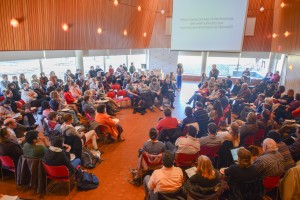
Grinnell College is an institution of higher learning that thrives on thoughtful dialogue around complex issues. In the past few years, the College has held a series of town hall meetings intended to bring together students, faculty and staff in an effort to more actively engage with issues facing the campus community. The first town hall meeting of this academic year dealt with the topics of “sexual respect and Title IX, alcohol and drug use, and diversity,” as per an all-campus email from Jim Reische, Vice President for Communications. Participants in the earlier town hall suggested topics for this week’s town hall. The following five topics were then presented to the campus community for a vote: Global Education, Sustainability, Technology and Learning, Understanding Grinnell’s Financial Sustainability and Work-Life Balance.
Two hundred and three people responded to the survey and while “Work-Life Balance” received the most votes, “Technology and Learning” was chosen as the topic for this town hall, as key College staff who would be expected to weigh in on the former were unavailable on the date of the town hall, according to Reische. Whereas work-life balance was not chosen as the topic of the town hall, Reische said the College has taken note regarding the interest that the topic generated.
“That’s the beauty of the survey: the feedback doesn’t just guide the choice of topic for one Town Hall, it can help shape the agenda for our ongoing community conversations and work throughout the year,” Reische wrote in an email to the S&B.
Two meetings were held Wednesday, at noon and 7:30 p.m. Moderated by Opeyemi Awe ’15, SGA Vice President for Student Affairs, the meetings served to discuss an institutional plan for technology as it affects students and faculty, the ways in which technology is likely to play a part in the College’s future and how it can be used to the College’s advantage.
Some issues discussed were the role of technology in students’ lives, the role of open source software in Grinnell College academics, Grinnell’s engagement with massive open online courses (MOOCs) and plans to update some of the outdated technology on campus, such as the computers in the Alumni Recitation Hall (ARH).
Conversations about the ways in which Grinnell should engage with technology have been especially prominent over the past few years. This past summer, President Raynard Kington created the Ad Hoc Committee on Technology and Learning. Featuring student, faculty and staff representatives, the committee aims to reach a holistic understanding of the ways in which technology affects the different components of a Grinnell education.
“Our charge is to understand the effect of technology on liberal learning, residential life and the meaning of a Grinnell degree,” said David Lopatto, Interim Vice President for Academic Affairs and Interim Dean of the College.
At the town hall, members of the campus community expressed several concerns regarding the way Grinnell engages in technology and the College’s technological future.
For Remy Ferber ’14, SGA Vice President for Academic Affairs, a major point of interest is the way in which Grinnell, as a residential college, will adapt to an increasingly technological world.
“We all are on a physical campus for a reason and we chose to attend a college where we interact with each other and professors,” Ferber said.
Another topic broached by several people was the College’s standing on the use of open source software.
Described by the Open Source Initiative as “software that can be freely used, changed, and shared (in modified or unmodified form) by anyone,” open source software, as opposed to proprietary software, is significantly more accessible and collaborative.
Currently, the College is not utilizing open source software on a large scale. However, there has been a move towards incorporating open source elements into certain campus technologies. Prominently, as Richard Fyffe, Librarian of the
College, pointed out, Grinnell Libraries have made extensive use of open source software.
The idea of incorporating technology into teaching at Grinnell has been gaining support over the past few years. This is especially reflected in the fact that two of the four 2012-2013 recipients of the Innovation Fund and the Mellon Humanities for Life Grants—which promotes innovative learning—secured funding for projects that relied heavily on using technology as a tool with which to supplement and further traditional teaching.
At the town hall, Sam Rebelsky, Computer Science, stressed the utility of technology as a learning tool and outlined four methods of teaching using online tools, online learning, blended learning and flipped classrooms—a method of learning where students watch lectures outside class and do problem sets in class.
Students also wanted to know if the College had plans for creating MOOCs. Seemingly in direct contrast with Grinnell’s model of small classrooms and direct engagement, MOOCs are an academic phenomenon capable of serving hundreds of thousands of students at once.
“I can’t see Grinnell being a producer, a major producer of MOOCs or having that as a primary part of our educational approach. It’s already a highly developed market and a lot of schools have already put in millions … into developing MOOCs. That is not something I can see us making a meaningful contribution into,” Kington said.
Though Kington does not see Grinnell offering MOOCs in the future, he did acknowledge the possibility of incorporating MOOCs into academic coursework.
Students, faculty and community members are invited to participate in the next town hall, which will take place next semester.
























































